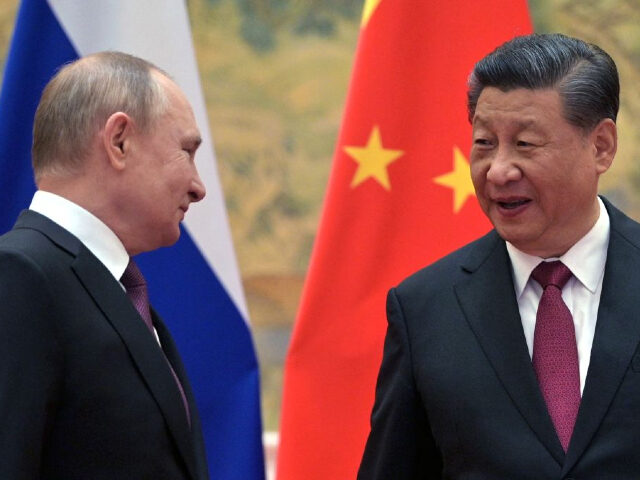Chinese dictator Xi Jinping will meet with his Russian ally Vladimir Putin during a visit to Kazakhstan and Uzbekistan that begins on Wednesday. The trip will mark Xi’s first journey beyond China’s borders since the beginning of the Wuhan coronavirus pandemic.
Xi is scheduled to arrive in Kazakhstan on Wednesday, then meet with Putin at the Shanghai Cooperation Organization (SCO) summit in Samarkand, Uzbekistan.
The SCO currently includes Russia, China, India, Pakistan, and the Central Asian “stans” of Kazakhstan, Kyrgyzstan, Tajikistan, and Uzbekistan. The organization is set to admit Iran as a full member next year.
Both Chinese and Russian officials confirmed on Monday the Xi-Putin meeting would take place, although there was little public discussion of the agenda for their meeting.
Economic and political cooperation between China and Russia has grown rapidly since Russia invaded Ukraine, and China was one of the few major nations to remain in Putin’s corner. Chinese shipments to Russia rose by 22.2 percent in July and 26.5 percent in August, even as the Western world imposed heavy sanctions on the Russian economy.
In turn, Russian imports to China increased by 49.3 percent and 59.3 percent. As of July, Russia was China’s top supplier of oil for three months in a row, and Putin recently remarked that Chinese demand for Russian energy is only growing. The Russians are planning a new pipeline through Mongolia that can deliver gas to China instead of Europe.
One possible complication for the Xi-Putin meeting could be Russia’s reversals of fortune in Ukraine, where a remarkably successful Ukrainian counter-offensive has Russian troops in retreat. It will be somewhat awkward for Xi if Putin finds a way to lose the war every other great power has condemned.
Foreign policy analysts expect the Xi-Putin summit to cement Xi’s position as the senior partner in the new axis of authoritarian regimes, while Putin will emphasize that Western opposition to his invasion of Ukraine has driven Russia permanently into China’s sphere of influence. When Xi and Putin met in Beijing in February, they announced a partnership with “no limits” and “no forbidden areas of cooperation” against the Western world.
Xi’s willingness to travel outside of China after two years, with only a month to go before the Chinese Communist Party congress, at which Xi will secure an unprecedented third term in power, appeared as a demonstration of confidence to foreign observers – essentially a way for Xi to show that he feels no need to remain in Beijing and micromanage Communist Party affairs ahead of his coronation.
Radio Free Europe (RFE) on Monday suggested Xi might be looking to flex his regional diplomatic muscles:
The Ukraine war has created a new and tumultuous era for Russia’s historic ties to Central Asia, with governments in Kazakhstan and Uzbekistan providing aid to Ukraine in the early months of the conflict and distancing themselves from Moscow. Kazakhstan has also been the target of threats from hard-line Russian commentators and officials about possibly annexing its territory in the north.
This sets the stage for Beijing to be an even more appealing partner to countries in the region — a tough balancing act for China to maintain as it looks to preserve its strategic relationship with Moscow and simultaneously expand its influence in a part of the world that the Kremlin has traditionally seen as its “backyard.”
Indian Prime Minister Narendra Modi is also scheduled to attend the SCO summit, giving Xi and Putin an opportunity to woo a longtime U.S. ally and China rival. India’s foreign ministry said Modi will probably “hold a few bilateral meetings on the sidelines of the summit,” but did not specify which countries he would be meeting with.

COMMENTS
Please let us know if you're having issues with commenting.